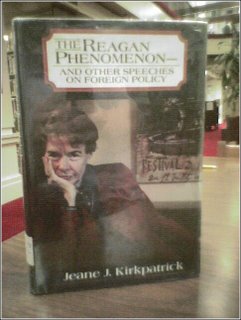May 29, 1981 -- the Sunday before Memorial Day, hazy in the morning in the Nation's Capital and unseasonably hot (with temperatures eventually reaching the 90s). It was Bob Hope's 78th birthday, it would have been John F. Kennedy's 64th, and it was the anniversary of Wisconsin's 1848 admission as a state in the Union and Rhode Island's ratification of the Constitution.
A Chorus Line was in its seventh year of a record-breaking Broadway run, but Cats (which would eventually overtake that record) had opened in London
was in its seventh year of a record-breaking Broadway run, but Cats (which would eventually overtake that record) had opened in London but not yet in New York
but not yet in New York . "Bette Davis Eyes
. "Bette Davis Eyes " by Kim Carnes was the Number 1 song hit. Jonny Lang was precisely four months old and Britney Spears would come along nearly six months later.
" by Kim Carnes was the Number 1 song hit. Jonny Lang was precisely four months old and Britney Spears would come along nearly six months later.
The Falklands War was a year away, John Belushi was still alive, and virtually no one had ever telephoned a friend to ask, "Where are you now?"
 May 29, 1981, was also a day of significance for me. It was the day I was graduated from Georgetown University.
May 29, 1981, was also a day of significance for me. It was the day I was graduated from Georgetown University.
As graduation ceremonies go, it was something of a turning point for Georgetown, too, as it proved to be the last of the unified ceremonies for all the graduates of the University's main campus schools. (The Dental, Law, and Medical schools had long held separate ceremonies.) This meant that SFS, SLL, SBA, the College, and the Nursing schools all gathered together on Healy Lawn to have their several degrees conferred -- undergraduate and graduate degrees alike.
Our class, however, turned out to be unusually rambunctious and rowdy. As you can see from the accompanying photo, I was seated quite far from the podium. Yet my most distinct memory of the afternoon was a champagne cork that was launched behind me and shot right over the head of University President Timothy S. Healy, S.J. (He was, later reports indicated, furious, swearing never to allow such behavior again. If I recall correctly, the next year's graduation speaker was Mother Teresa, in a gambit to stifle rudeness with reverence.) I still have my cap and gown from that day, and my academic hood is splattered with red and pink dots from nearby champagne spills.
The day was also marked by a political protest by those who objected to the choice of commencement speaker, Georgetown government professor Jeane J. Kirkpatrick, who at the time was on leave serving as the U.S. Permanent Representative to the United Nations. Like our current Secretary of State Condoleezza Rice, who recently met a similar protest at another Jesuit school, Boston College, a number of graduates in the Class of 1981 chose to turn their backs on the speaker, and others wore white armbands to show their objections.
To put this in context, the Reagan Administration had been in office for about four months. One of its first diplomatic objectives was to stem the tide of Communist influence in the Western Hemisphere, particularly in Central America, where the Sandinistas had been ruling Nicaragua for two years and a civil war continued to rage in El Salvador. A few months earlier, during the waning months of the Carter Administration, four American Catholic missionaries, all women, had been murdered in El Salvador. A few weeks earlier, on May 3, an estimated 100,000 people marched in Washington to protest the administration's Salvador policy.
Kirkpatrick, as a member of the Cabinet and National Security Council, was a key decision maker in the Reagan Administration's foreign-policy apparatus. As Ambassador to the United Nations, she was also one of the administration's chief foreign-policy spokesmen. So it should be no surprise that she would be a target of protest aimed more generally at the administration.
In her speech, Kirkpatrick tried to deflect the political intensity of the occasion. She began by recounting her strong ties to the University community:
The pleasure I feel in addressing you today is of a very special sort. It is the kind of pleasure one feels upon being reunited with members of one's own family after a prolonged and perhaps traumatic separation. It is the kind of pleasure that Samuel Johnson called "the wine of life" and that St. Augustine said "rejoices the soul." It is, in short, the pleasure of homecoming.
Receiving an honorary degree is naturally gratifying, but sharing a graduation with some of one's own students is a very special pleasure. So is the opportunity to see once again my many friends in this university's faculty, student body, and administration.
Alluding to the objections that greeted the announcement that she would be the commencement speaker, Kirkpatrick recounted -- quite literally -- her travails as a Georgetown professor:
Although I am not in residence, I remain objectively and subjectively a member of this community. That is the reason why I could not possibly oblige the request that one member of this community made to me that I withdraw from this commencement because of some views I presumably hold. I have earned my right to membership in this community. It is my sober calculation that, in the past fifteen years, I have graded at least 10,000 examinations, at least 3,500 term papers, read at least 100 dissertations -- including one whose author is receiving a doctor's degree today -- given at least 3,000 lectures and 738 makeup exams, attended 4,714 committee meetings, and eaten 892 hotdogs from Wisemiller's. In the process, Georgetown University has become part of me. It is an identification I cherish.
The line, "I have earned my right to membership in this community," was met with scattered catcalls and jeers, but the rest of the passage was received with enthusiastic applause and cheers.
During the next few minutes, Kirkpatrick hearkened back to Georgetown's history and its place in U.S. history.
I cherish it because this university is, in my firm opinion -- an opinion based on detailed knowledge -- a serious and distinguished university.
(I'll second that.)
Moreover, I like it. I like the way its history is intricately intertwined with that of our nation. Born the same year as the nation's Constitution, situated on the river that George Washington walked beside, Georgetown has for two centuries embodied and communicated the moral and intellectual commitment and discipline that characterize our civilization at its best.
Of course, not everyone has always shared this benign view of the university and of its founders and owners and managers, the Society of Jesus. One of the nation's Founding Fathers, I discovered, wrote to another of the nation's Founding Fathers not long after the establishment of Georgetown: "I do not like the reappearance of the Jesuits. If ever there was a body of men who merited damnation on earth and in hell it is the Society of Loyola's. Nevertheless we are compelled by our own system of religious toleration to offer them an asylum." Thus wrote John Adams to Thomas Jefferson. Oh well, it's never been possible to please all the people all the time.
(She does not say how Mr. Jefferson replied.)
In the rest of her remarks, framed as a discussion of the quality of the students at Georgetown, Kirkpatrick proved unusually prescient.
Keep in mind that, at the beginning of the Reagan administration, the United States was still suffering from the stagflation of the 1970s, with accompanying high interest rates, record-high gasoline prices (and gas lines and gas shortages), and a major recession featuring huge swathes of unemployment. We were at the height of the Cold War and knew not who would win (or even if victory was possible). Even the Pope had recently been the victim of an assassination attempt by a Communist agent. It looked like the United States and the Soviet Union would be
locked in a generations-long conflict, forever on the brink of nuclear war. This was the world in which we lived, and in which we expected to live for a long, long time. In short, we were feeling pinched by our circumstances, so pessimism would not have been unrealistic for many graduates at the time, who were uncertain of gaining employment even with a prestigious college degree.
The Reagan tax cuts and regulatory reforms had not yet taken effect, nor had they jumpstarted the economy to begin the longest uninterrupted, peacetime economic expansion in history. So Kirkpatrick's speech at the 1981 Georgetown commencement exercises showed both optimism and, it turned out, foresight.
"We come here today," she said
neither to praise nor to blame Georgetown but to talk about you, the graduates, and to a lesser extent your parents. I know rather more than the average commencement speaker about both of you. I have read the statistical profiles of your class since before you entered as freshmen. Moreover, I know a good deal firsthand about the anxieties and gratifications and the expenses of parents. I've been there -- indeed, I am there. But what do I know about your futures?
I know that students, all of you, are now and will for some time continue to be faced with more freedom and more choices than any other comparable generation in human history, in part but not only because this is an extraordinarily free society, one that permits us to live where we like, to read and write what we choose, to worship according to our conscience, to practice any profession we are able. Those freedoms were also enjoyed by Greeks in Athens' Golden Age providing they happened to be free and not slave, providing they happened to be citizens and not foreigners. But we, you and I, enjoy freedoms of which the Athenians never dreamed because contemporary technology has given us unprecedented powers and their attendant choices. You graduates are blessed and cursed with the freedom and the necessity to define yourself, to choose from among the dazzling array of attitudes, values, roles, your own -- what has come to be called -- life style.
(So true, so true indeed.)
Once your role would have been settled at birth. The son of a swineherd, you would have been a swineherd. The son of a merchant, you would have been a merchant. And the daughter of either, you would have ben the wife and mother of more swineherds and merchants.

Just for the record, I am not quoting Ambassador Kirkpatrick's speech from memory. The text is found in her 1982 book,
The Reagan Phenomenon and Other Speeches on Foreign Policy
. Oddly enough, I had to find the book at the
Jefferson-Madison Regional Library. I say "oddly" because I compiled the index for that book, as a favor to its editor (and for a reasonable fee), during the World Series of 1982 -- but I don't have it in my collection of books I have had a hand in. (Also strange: Although Kirkpatrick wrote a dozen or more books, this was the only one of hers in the library's entire collection. Luckily for me it was shelved at the Central Library branch in downtown Charlottesville.)
Next weekend my classmates and I will gather on the Hilltop to celebrate at our 25-year reunion. No doubt individuals have advanced to varying levels of success. Some will be doing exactly what they expected they would do upon graduation; many others will have taken their lives in totally unexpected directions.
Last Friday over dinner, a friend of mine who graduated from the University of Virginia asked me who was the most famous member of my own graduating class at Georgetown. He was fishing for names of Members of Congress or other political figures.
I could not think of any members of my class who have become successful Washington politicians. Perhaps there are a few. I suspect some may have been elected -- or tried to be elected -- as city councilors, mayors, even state legislators. I hope they show up at the reunion so we can trade campaign war stories.
I am sure that there are more than a few 1981 alumni who are well-known and well-respected in their professions (lawyers, doctors, scientists). At least one is a university president. I am unaware of any Oscar-, Tony-, Grammy-, or Emmy-winning 1981 Hoyas -- but I would be most pleased to learn of some.
But "most famous"? That actually turns out to be easy to answer, if by "fame" one means known to the largest number of people.
If that's the case, my classmate (and one-time Living-Learning Project floormate)
Amy Dickinson is the "most famous member of the Georgetown Class of '81." Amy, as the successor to the
Chicago Tribune's Ann Landers, is a syndicated advice columnist
in at least 200 newspapers, including the
Los Angeles Times and
Washington Post. She is also heard as a sometime panelist on
NPR's "Wait, Wait ... Don't Tell Me."
I'm looking forward to the reunion, in particular, for the opportunity to see again my fellow
Mask & Bauble alumni. As anyone who has done college theatre can tell you, working together on shows is a uniquely, intensely bonding experience. (I sometimes estimate that I spent more hours in Stage III during my first three years of college than I did in the classroom. My fourth-year grades demonstrate the likely accuracy of that estimate.) A special cocktail reception for M&Bers is planned.
Next year I have a twofer -- or double whammy, depending on how you look at it -- 30 years since my graduation from
Marquette University High School in Milwaukee and 20 years since receiving my master's degree from the
London School of Economics and Political Science. I guess 2007 will be a big year for parties.
Addendum: Since posting this article, I came across an amusing compilation of excerpts from this year's crop of commencement addresses, in
the Reliable Source column in Sunday's
Washington Post Style section. Very funny on line, but best seen in the print edition for full effect.
Update and Correction, July 3: I just made an embarrassing discovery, and as a blogger I have an ethical obligation to correct it. (We talked about this sort of thing at length at the
Sorensen Institute bloggers' summit.) It turns out my graduation from Georgetown was not on May 29, 1981, but rather on Sunday,
May 24. (I found this date on the program for the "Baccalaureate Mass, 182nd Annual Commencement of Georgetown University" and confirmed it by looking at my diploma. D'oh!) This means, of course, that all that nifty trivia in the first two paragraphs is irrelevant. The rest, however, is accurate. I apologize for the error but have to ask -- why didn't anyone else catch it before now?












